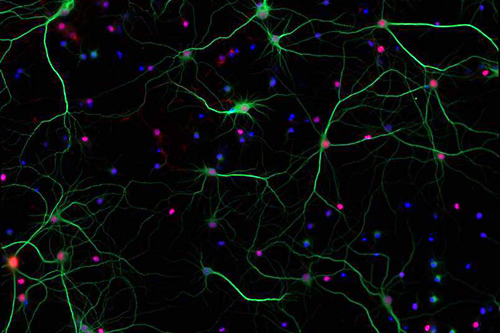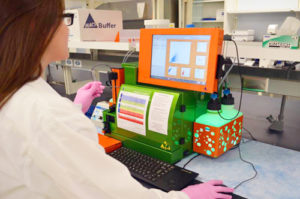Dr. Jacqueline Quandt is the Associate Director of the UBC MS Research Group at UBC and leads the Neuroinflammation Lab at the Djavad Mowafaghian Centre for Brain Health and the Department of Pathology in the Faculty of Medicine. Her research is focused on understanding the role of the immune system in both damage and repair of the brain and spinal cord as a result of neurodegenerative diseases, such as Multiple Sclerosis. Using cell-based and more complex disease models, researchers in the Quandt Lab study the relationships between inflammation and neuronal death.
“MS was previously thought of as an autoimmune disease,” says Dr. Quandt, “and stopping bad immune cells was the primary goal.”
“But we’re starting to see greater correlations between MS and neurodegenerative disorders, and focusing more on protecting and repairing cells in the brain. Just as in Parkinson’s or Alzheimer’s disease, it is the specific loss of neurons and the axons they extend through our body that account for disability. There is a complex relationship between the immune and nervous systems; how immune cells cause damage to the brain and nervous system is something we’re paying close attention to.”

Cortical neurons grown in the laboratory
The Quandt lab’s current projects are diverse, but most apply molecular and cellular techniques in cell and disease models to study the way that inflammatory cells contribute to disease development. Having made significant contributions to MS research, the lab is now pursuing discovery in a range of neurodegenerative diseases.

Dr. Quandt (third from left) at a VGH+UBC Hospital Foundation donor-recognition event.
New equipment to propel research forward
Recently, the Quandt lab received a generous donation in the form of two essential pieces of technology. A fluorescence microscope enables the lab to study disease development at several levels: from the micro (what’s happening within a single cell) to the macro (monitoring disease associated changes in MS tissues that occur over time).
The flow-cytometer allows researchers to analyze up to a million cells a minute, which can be critical for time sensitive experiments. This is a boost to Dr. Quandt’s research program, in that it will enable researchers in her lab to study numerous characteristics or proteins within precious samples, even something like a rare cell in the cerebrospinal fluid, with precision.

Sarah Neil, technician in Dr. Quandt’s lab, using the new flow-cytometer
Dr. Quandt believes that the new equipment will help drive ongoing research into the delicate balance between damage and repair in the nervous system by immune cells. Studying these processes at the cellular and tissue levels and directly in the disease itself, enhances the potential to translate findings directly to patients and the play a pivotal role in developing new therapies to limit disease development and progression. The research ties together several lines of MS research going on at UBC, where researchers and clinicians are working together on the clinical, genetic, immunological, diagnostic/imaging and epidemiological aspects of the disease to improve treatment and care.
For more information, visit quandtlab.com.


